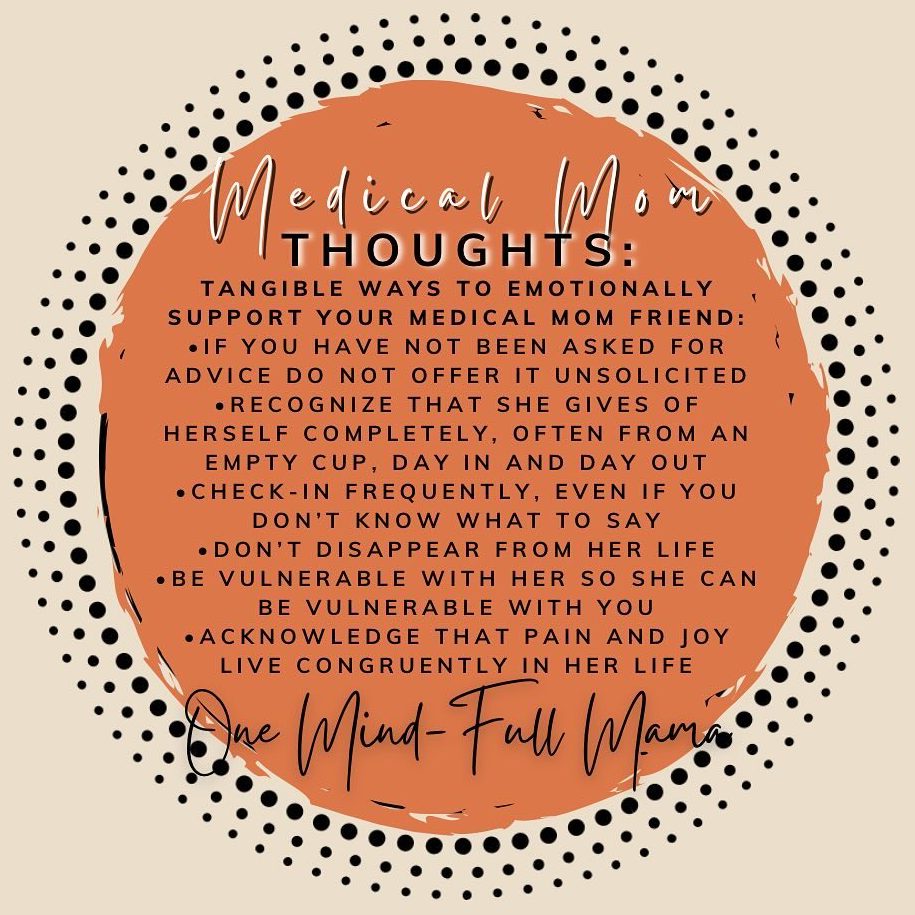Child bereavement doesn’t just come when a baby is lost, it shows up when a piece, or pieces, of your child is lost or stolen by trauma. Parents of children who experience suffering due to a rare disease or medical complexity experience immense grief. On top of this, many times these parents turned caregivers have very little emotional support from friends and family because those closest to them become frozen in a loop of not knowing what to do or not wanting to cause added stress. The former are the ones who usually fade out of their friends life leaving behind another thing for them to heal from. The latter often offers help but places the responsibility at the feet of the person desperately needing some of the burden to be lifted. If you find yourself in a position of wanting to help someone such as this by carrying one of their many obligations, here are a few tangible ways to do just that.
- If you have not been asked for advice, do not offer it unsolicited.
- Recognize that your friend gives of themselves completely, often from an empty cup, day in and day out.
- Check-in frequently, even if you don’t know what to say.
- Do not disappear from their life.
- Be vulnerable with them so they can be vulnerable with you.
- Acknowledge that pain and joy live congruently in their life.
If you have been in the life of a medical parent for any length of time as an active member of their village then you know that they are the experts on their child’s condition. You also know that they spend countless hours researching, trying new treatments and discussing changes with their child’s medical team, which often consists of many medical professionals each specializing in a small part of the whole picture. To offer unsolicited advice on how to do a better job in any way, whether it be taking care of themselves, their child, trying a new medication/supplement/diet/herbal remedy/etc. is just inconsiderate and to be honest disrespectful on top of maddening.
Medical parents give every ounce of love, energy, time, strength, faith and hope they have and more to and for their children. Recognize this and hold space for it. This is usually the reason we fail to return communications and do not remember all the things we used to. We simply do not have any extra capacity for anything else when we are already beyond capacity.
Expanding on that last thought, check-in with us frequently. We may not be able to respond quickly, or we may forget, but the check-in helps us feel less alone.
Many people disappear from our lives. If you are still present please know that you matter to us. Disappearing, or grief ghosting us (explained in another post) just adds more grief and trauma to our already maxed out lives. We know you don’t know what to say. We know you don’t know what to do. We know you don’t know how we do it and that you can’t understand. All of that doesn’t matter if you just stay open to loving us the way we need to be loved instead of the way you want to love us and have a willingness to be uncomfortable. Imagine the emotions we go through in this life, surely you cab be uncomfortable for an hour or so!
If you want us to share and be open with you, you need to share and be open with us. Vulnerability comes in a safe shared space, not a space where only one person is ever focused on. It’s like we are put under a microscope sometimes by friends and family expecting to be updated with every appointment and that is the only communication that happens. It’s nice to just hear about how you are doing without having to go into detail about all the hard things about our lives.
Pain and joy live and share space in our lives. Acknowledge this by allowing us to share the duality of a joyful moment or by being attuned enough to see that while a particular moment may hold significant joy, it also holds a large amount of grief. Our children often celebrate small victories because the large milestones aren’t part of our walks. This is something we mourn. Our children have also had to endure more than any other typical person so when a victory happens it shares space with that fact.
Bereavement can happen anytime you mourn a significant loss that greatly impacts your life. Parents of children with medical complexities experience this level of loss throughout the life of their child due to the nature of their condition and how it impacts both of their lives on a continual basis. This does not mean that they grieve their child, only the things they must endure. So the next time you get stuck in the frozen loop of what to do, I hope you consider what has been shared here and action is taken despite however comfortable or uncomfortable it may be.
